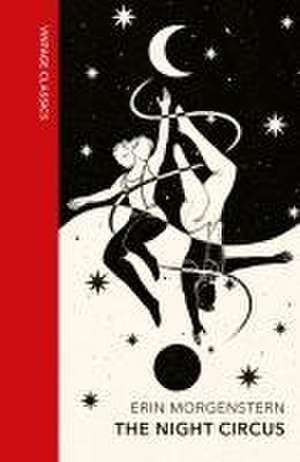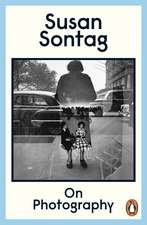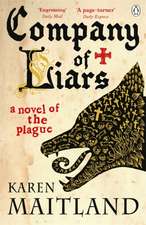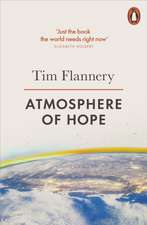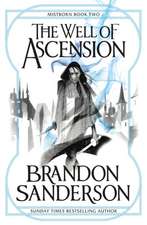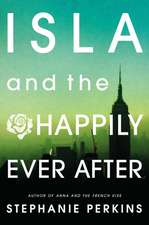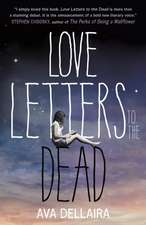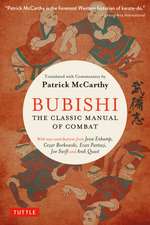The Night Circus: Vintage Classics
Autor Erin Morgensternen Limba Engleză Hardback – 4 apr 2024
The circus arrives without warning. No announcements precede it. It is simply there, when yesterday it was not. Within the black-and-white striped canvas tents is an utterly unique experience full of breathtaking amazements. It is called Le Cirque des Rêves, and it is only open at night.
But behind the scenes, a fierce competition is underway: a duel between two young magicians, Celia and Marco, who have been trained since childhood expressly for this purpose by their mercurial instructors. Unbeknownst to them both, this is a game in which only one can be left standing. Despite the high stakes, Celia and Marco soon tumble headfirst into love, setting off a domino effect of dangerous consequences, and leaving the lives of everyone, from the performers to the patrons, hanging in the balance.
Author Q&A with Erin Morgenstern
This is a lovely and unique story. Why a circus? How did this story first come to you—through a character, a plotline, an emotion?
The story came as a location created out of desperation. I was working on a different story altogether, one that was becoming progressively more and more boring because nothing was happening. I needed something exciting to happen and I couldn't figure out how to do it with the locations I had so I sent the characters to the circus. That circus was immediately much more interesting and eventually I abandoned that other story and its characters entirely and focused on the circus instead. What eventually became The Night Circus started from exploring that spontaneously-created location, figuring out who created it and who performed in it and what its story was.
What was your inspiration for some of the amazing acts in this circus?
Some of them were traditional circus acts or attractions made a bit more unique, like the acrobats performing directly overhead or the carousel that doesn't simply go in circles. The Cloud Maze is a play on a climbing maze I hazily recall from childhood visits to the Boston Children's Museum. Other tents were created based on color, or lack thereof. I had a lot of dark tents and wanted something lighter and white, the Ice Garden developed from that relatively simple starting point.
Do you have a favorite character?
It's impossible to pick a true favorite, though Poppet & Widget are very dear to my heart as they're the first of the characters to turn up in my imagination. They're also just plain fun, both individually and as a pair.
What was the most challenging aspect of developing this story?
It didn't have a plot for a very long time. Really, my biggest challenge was finding the actual story within all the atmosphere. I had the place and the characters and the feel of the book long before it had a proper story structure to tie everything together. The novel went through a great many revisions before it figured out what it wanted to be, I tried things that didn't work and then things that sort of worked and replaced old ideas with new ones until I got it right.
Is there an emotion that you had to spend a lot of time with that made you uncomfortable?
I'm an emotional sort of person in general and I have a vivid imagination, so I feel the whole spectrum of emotion strongly when I write. It's something I'm used to, though, so nothing in particular made me uncomfortable. There is a lot of frustration felt by various characters, which is not the nicest emotion to be spending a lot of time with, but it helps to drive characters to actions which bring different emotions along.
Tell me about your writing life. Do you have any rituals?
I binge write. I think it's because I started seriously writing by participating in National Novel Writing Month, an online-based challenge to write 50,000 words in 30 days. I don't have as tight a time limit anymore but I still write in long marathon sessions and then I won't write for a while, I'm not a write-every-day writer. I go back and forth between input phases where I'm reading a lot or trying to get out and explore the world a bit and soak up inspirations and then I'll get back into output mode and write and write and write.
I don't have any particular rituals, I sometimes like to write in longhand when I'm searching for ideas but I do the vast majority by typing, I can't always keep up with my thoughts longhand. I'm not a coffeeshop writer because I feel obliged to order more coffee and then I end up over-caffeinated.
What’s the one true thing you learned from your characters in this novel?
I think it's something that I knew already but explored more with these characters, that nothing is as simple as black or white, good or evil. There are all those shades of grey and everyone acts from a place that they see as right and true. (Though they are allowed to change their minds.)
| Toate formatele și edițiile | Preț | Express |
|---|---|---|
| Paperback (5) | 56.79 lei 23-34 zile | +25.17 lei 6-10 zile |
| Vintage Publishing – 24 mai 2012 | 56.79 lei 23-34 zile | +25.17 lei 6-10 zile |
| Random House – 6 oct 2016 | 57.80 lei 23-34 zile | +26.88 lei 6-10 zile |
| Random House – 24 mai 2012 | 58.09 lei 3-5 săpt. | +11.62 lei 6-10 zile |
| Random House LLC US – mai 2012 | 70.38 lei 17-23 zile | +6.10 lei 6-10 zile |
| Anchor Books – 30 iun 2012 | 110.61 lei 3-5 săpt. | +18.70 lei 6-10 zile |
| Hardback (3) | 103.38 lei 23-34 zile | +40.14 lei 6-10 zile |
| Random House – 4 apr 2024 | 103.38 lei 23-34 zile | +40.14 lei 6-10 zile |
| Doubleday Books – 31 aug 2011 | 211.19 lei 3-5 săpt. | |
| Bloomsbury Publishing – 30 iun 2012 | 223.82 lei 3-5 săpt. |
Din seria Vintage Classics
- 12%
 Preț: 75.97 lei
Preț: 75.97 lei - 17%
 Preț: 52.35 lei
Preț: 52.35 lei -
 Preț: 88.88 lei
Preț: 88.88 lei - 17%
 Preț: 51.70 lei
Preț: 51.70 lei - 16%
 Preț: 53.83 lei
Preț: 53.83 lei - 16%
 Preț: 58.84 lei
Preț: 58.84 lei - 18%
 Preț: 51.14 lei
Preț: 51.14 lei - 16%
 Preț: 52.89 lei
Preț: 52.89 lei - 17%
 Preț: 51.79 lei
Preț: 51.79 lei - 17%
 Preț: 52.14 lei
Preț: 52.14 lei - 15%
 Preț: 54.35 lei
Preț: 54.35 lei - 17%
 Preț: 51.83 lei
Preț: 51.83 lei - 13%
 Preț: 56.71 lei
Preț: 56.71 lei - 24%
 Preț: 74.89 lei
Preț: 74.89 lei - 17%
 Preț: 52.70 lei
Preț: 52.70 lei - 17%
 Preț: 52.49 lei
Preț: 52.49 lei - 18%
 Preț: 56.49 lei
Preț: 56.49 lei - 25%
 Preț: 64.05 lei
Preț: 64.05 lei - 15%
 Preț: 60.02 lei
Preț: 60.02 lei - 18%
 Preț: 45.75 lei
Preț: 45.75 lei -
 Preț: 63.50 lei
Preț: 63.50 lei -
 Preț: 131.84 lei
Preț: 131.84 lei - 17%
 Preț: 52.33 lei
Preț: 52.33 lei -
 Preț: 110.32 lei
Preț: 110.32 lei - 17%
 Preț: 52.04 lei
Preț: 52.04 lei - 16%
 Preț: 53.59 lei
Preț: 53.59 lei -
 Preț: 101.80 lei
Preț: 101.80 lei - 14%
 Preț: 61.78 lei
Preț: 61.78 lei - 14%
 Preț: 72.12 lei
Preț: 72.12 lei - 17%
 Preț: 52.70 lei
Preț: 52.70 lei - 16%
 Preț: 80.68 lei
Preț: 80.68 lei - 16%
 Preț: 53.96 lei
Preț: 53.96 lei - 21%
 Preț: 55.80 lei
Preț: 55.80 lei - 16%
 Preț: 53.53 lei
Preț: 53.53 lei - 17%
 Preț: 52.70 lei
Preț: 52.70 lei -
 Preț: 84.72 lei
Preț: 84.72 lei - 12%
 Preț: 41.29 lei
Preț: 41.29 lei - 17%
 Preț: 57.06 lei
Preț: 57.06 lei - 16%
 Preț: 52.95 lei
Preț: 52.95 lei - 14%
 Preț: 72.63 lei
Preț: 72.63 lei - 18%
 Preț: 51.16 lei
Preț: 51.16 lei - 23%
 Preț: 53.46 lei
Preț: 53.46 lei -
 Preț: 96.67 lei
Preț: 96.67 lei -
 Preț: 109.71 lei
Preț: 109.71 lei -
 Preț: 133.42 lei
Preț: 133.42 lei -
 Preț: 98.78 lei
Preț: 98.78 lei - 14%
 Preț: 61.94 lei
Preț: 61.94 lei - 34%
 Preț: 40.46 lei
Preț: 40.46 lei - 17%
 Preț: 51.70 lei
Preț: 51.70 lei -
 Preț: 119.66 lei
Preț: 119.66 lei
Preț: 103.38 lei
Preț vechi: 121.92 lei
-15% Nou
19.78€ • 21.56$ • 16.67£
Carte disponibilă
Livrare economică 04-15 aprilie
Livrare express 18-22 martie pentru 50.13 lei
Specificații
ISBN-10: 1784879665
Pagini: 496
Dimensiuni: 138 x 201 x 45 mm
Greutate: 0.53 kg
Editura: Random House
Seriile Vintage Classics, Vintage Quarterbound Classics
Notă biografică
Erin Morgenstern is a writer and a multimedia artist, who describes all her work as 'fairy tales in one way or another'. She lives in Boston, Massachusetts.
www.erinmorgenstern.com
Facebook.com/thenightcircus
www.nightcircus.co.uk
Recenzii
"The Night Circus made me happy. Playful and intensely imaginative, Erin Morgenstern has created the circus I have always longed for and she has populated it with dueling love-struck magicians, precocious kittens, hyper-elegant displays of beauty and complicated clocks. This is a marvelous book."
-- Audrey Niffenegger, author of The Time Traveler’s Wife
"If this novel is just cotton candy, it's cotton candy spun from strands of edible silver...With no more lust than a late volume of Harry Potter, Morgenstern manages to conjure up a love story for adults that feels luxuriously romantic. When Celia calls their circus a 'wonder and comfort and mystery all together,' she could have been talking about this book."
--Ron Charles, The Washington Post
"A Romeo and Juliet tale drenched in magic realism, The Night Circus defies both genres and expectations. In short, it's a showstopper."
--The Boston Globe
“Erin Morgenstern's debut novel, The Night Circus, is quietly, enchantingly perfect…reading this novel is like having a marvelous dream, in which you are asleep enough to believe everything that is happening, but awake enough to relish the experience and understand that it is magical.”
--Newsday
“[A] dark and extravagantly imagined debut…The plot follows the separate and then intertwining lives of Celia and Marco, both forced to spend their lives pitting their unusual talents against each other in a cruel competition. But their world is Morgenstern’s most vivid creation, a fantastical circus featuring illusionists whose powers transcend mere sleight of hand; like those performers, the author entices her audience to suspend disbelief and rewards its members with captivating pleasure.”
--People magazine
"Morgenstern's exquisitely realized world will have the reader wishing to run off and join this circus."
--USA Today
"Morgenstern’s Circus is the stuff that dreams are made of, and nothing short of a wild ride."
--Elle magazine
"Magical. Enchanting. Spellbinding. Mesmerizing."
--Associated Press
"[A] few pages into this story of a mysterious circus and its two stars, a young man and a woman who are both capable of real magic, and you know you are in the presence of an extraordinary storyteller."
--The Daily Beast
“Morgenstern’s novel feels crafted from the fabric of a dream, and the circus itself never fails to astound. For me, the only real disappointment was that I couldn’t buy a ticket.”
--The Christian Science Monitor
"[T]he world of The Night Circus is elaborately designed, fantastically imagined and instantly intoxicating -- as if the reader had downed a glass of absinthe and leapt into a hallucination."
--Rachel Syme for NPR.org
"Two star-crossed magicians, Celia and Marco, duel for supremacy against the backdrop of a big top unlike any other. Morgenstern conjures up a world of dark enchantment and romance in this dazzling foray into the dreamscape of illusion."
--Family Circle
"A beguiling, gripping read...Ms. Morgenstern has crafted a thrilling and transporting tale. In so doing she makes it clear that of all the shapes magic may take, storytelling is often the most powerful of them all."
--The Economist
"Debut author Morgenstern doesn't miss a beat in this smashing tale of greed, fate, and love...a giant, magical story destined for bestsellerdom. This is an electric debut on par with Special Topics in Calamity Physics."
--Publishers Weekly, starred review
"Self-assured, entertaining debut that blends genres and crosses continents in quest of magic… Generous in its vision and fun to read. Likely to be a big book—and, soon, a big movie, with all the franchise trimmings."
—Kirkus Reviews, starred review
“To enter the black-and-white-striped tents of Le Cirque des Rêves is to enter a world where objects really do turn into birds and people really do disappear…Debut novelist Morgenstern has written a 19th-century flight of fancy that is, nevertheless, completely believable. The smells, textures, sounds, and sights are almost palpable. A literary Mr. Toad’s Wild Ride, this read is completely magical.”
—Library Journal, starred review
"This big and compelling first novel ushers in a menacing tone with its first sentence: "The circus arrives without warning."...With appeal for readers not particularly geared to fantasy but who plainly enjoy an unusual and well-drawn story, this one will make a good crossover suggestion."
--Booklist, starred review
“‘Dark as soot and bright as sparks,’ The Night Circus still holds me willingly captive in a world of almost unbearable beauty. This is a love story on a grand scale: it creates, it destroys, it ultimately transcends. Take a bow, Erin Morgenstern. This is one of the best books I have ever read.”
—Brunonia Barry, author of The Lace Reader
“A riveting debut. The Night Circus pulls you into a world as dark as it is dazzling, fully-realized but still something out of a dream. You will not want to leave it.”
—Téa Obreht, author of The Tiger’s Wife
"Every once in awhile you find a novel so magical that there is no escaping its spell. The Night Circus is one of these rarities -- engrossing, beautifully written and utterly enchanting. If you choose to read just one novel this year, this is it."
—Danielle Trussoni, author of Angelology
"Pure pleasure...Erin Morgenstern is a gifted, classic storyteller, a tale-teller, a spinner of the charmed and mesmerizing -- I had many other things I was supposed to be doing, but the book kept drawing me back in and I tore through it. You can be certain this riveting debut will create a group of rêveurs all its own."
—Aimee Bender, author of The Particular Sadness of Lemon Cake
“The Night Circus is a gorgeously imagined fable poised in the high latitudes of Hans Christian Anderson and Oscar Wilde, with a few degrees toward Hesse’s “Steppenwolf” for dangerous spice. The tale is masterfully written and invites allegorical interpretations even as its leisurely but persistent suspense gives it compelling charm. An enchanting read.”
—Katherine Dunn, author of Geek Love
"The Night Circus is a very atmospheric tale in which things are seen in the half-light of another century's lamps. Morgenstern makes much of these shadows. She also clearly savors objects such as unusual clocks, vanishing rings, flaming cauldrons and strange carousels, and will make you savor them as well."
--Los Angeles Times
"Puts me in mind of Ray Bradbury's Something Wicked This Way Comes lightened up by Harry Potter. This will be big."
--Library Journal
"This dueling-sorcerers premise brings to mind Susanna Clarke's magnificent 2004 novel, Jonathan Strange & Mr. Norrell...[Morgenstern] employs her supple prose to conjure up a series of wonders: A maze made of clouds, a ship of books floating on a sea of ink, a tent that seems to contain a vast desert."
--Salon.com
"Erin Morgenstern's The Night Circus is a standout. With echoes of Alice Hoffman (fairy tale magic), Audrey Niffenegger (teleporting) and J.K. Rowling (young wizards, here magicians), Morgenstern's debut is lifted by its poetic writing, winking literary allusions and thematic cohesion."
--The Kansas City Star
"Erin Morgenstern has crafted a debut that is original and surprising and fitted it with a wonderful conclusion. She's revealed herself as a writer worthy of notice."
--The Denver Post
"If the preamble -- so aptly titled 'Anticipation' -- doesn't make you sit right down on the floor of your library or bookstore to see what Morgenstern conjures up next, you may not be the right reader for this novel. I'll wager, however, that you will fall quickly under her spell."
--Star Tribune
"So should you read Erin Morgenstern's debut novel, The Night Circus? The short answer: 'Yes.' The Book is engaging and magical, entrancing the reader every step of the way."
--Huffington Post
"The circus is a veritable cornucopia of sights and sounds and appetizing scents. It is a fantasia, a fairy tale writ large and come to life."
--Slant Magazine
"The Night Circus succeeds on a grand scale...Morgenstern's lush descriptions are magnetic, as if conjured by spell. The joy of reading this book is its offer of pure escapism."
--Nashville Scene
Descriere
NEW YORK TIMES BESTSELLER
The circus arrives without warning. No announcements precede it. It is simply there, when yesterday it was not. Within the black-and-white striped canvas tents is an utterly unique experience full of breathtaking amazements. It is called Le Cirque des Rêves, and it is only open at night.
But behind the scenes, a fierce competition is underway: a duel between two young magicians, Celia and Marco, who have been trained since childhood expressly for this purpose by their mercurial instructors. Unbeknownst to them both, this is a game in which only one can be left standing. Despite the high stakes, Celia and Marco soon tumble headfirst into love, setting off a domino effect of dangerous consequences, and leaving the lives of everyone, from the performers to the patrons, hanging in the balance.
Author Q&A with Erin Morgenstern
This is a lovely and unique story. Why a circus? How did this story first come to you—through a character, a plotline, an emotion?
The story came as a location created out of desperation. I was working on a different story altogether, one that was becoming progressively more and more boring because nothing was happening. I needed something exciting to happen and I couldn't figure out how to do it with the locations I had so I sent the characters to the circus. That circus was immediately much more interesting and eventually I abandoned that other story and its characters entirely and focused on the circus instead. What eventually became The Night Circus started from exploring that spontaneously-created location, figuring out who created it and who performed in it and what its story was.
What was your inspiration for some of the amazing acts in this circus?
Some of them were traditional circus acts or attractions made a bit more unique, like the acrobats performing directly overhead or the carousel that doesn't simply go in circles. The Cloud Maze is a play on a climbing maze I hazily recall from childhood visits to the Boston Children's Museum. Other tents were created based on color, or lack thereof. I had a lot of dark tents and wanted something lighter and white, the Ice Garden developed from that relatively simple starting point.
Do you have a favorite character?
It's impossible to pick a true favorite, though Poppet & Widget are very dear to my heart as they're the first of the characters to turn up in my imagination. They're also just plain fun, both individually and as a pair.
What was the most challenging aspect of developing this story?
It didn't have a plot for a very long time. Really, my biggest challenge was finding the actual story within all the atmosphere. I had the place and the characters and the feel of the book long before it had a proper story structure to tie everything together. The novel went through a great many revisions before it figured out what it wanted to be, I tried things that didn't work and then things that sort of worked and replaced old ideas with new ones until I got it right.
Is there an emotion that you had to spend a lot of time with that made you uncomfortable?
I'm an emotional sort of person in general and I have a vivid imagination, so I feel the whole spectrum of emotion strongly when I write. It's something I'm used to, though, so nothing in particular made me uncomfortable. There is a lot of frustration felt by various characters, which is not the nicest emotion to be spending a lot of time with, but it helps to drive characters to actions which bring different emotions along.
Tell me about your writing life. Do you have any rituals?
I binge write. I think it's because I started seriously writing by participating in National Novel Writing Month, an online-based challenge to write 50,000 words in 30 days. I don't have as tight a time limit anymore but I still write in long marathon sessions and then I won't write for a while, I'm not a write-every-day writer. I go back and forth between input phases where I'm reading a lot or trying to get out and explore the world a bit and soak up inspirations and then I'll get back into output mode and write and write and write.
I don't have any particular rituals, I sometimes like to write in longhand when I'm searching for ideas but I do the vast majority by typing, I can't always keep up with my thoughts longhand. I'm not a coffeeshop writer because I feel obliged to order more coffee and then I end up over-caffeinated.
What’s the one true thing you learned from your characters in this novel?
I think it's something that I knew already but explored more with these characters, that nothing is as simple as black or white, good or evil. There are all those shades of grey and everyone acts from a place that they see as right and true. (Though they are allowed to change their minds.)
Extras
ANTICIPATION
The circus arrives without warning.
No announcements precede it, no paper notices on downtown posts and billboards, no mentions or advertisements in local newspapers. It is simply there, when yesterday it was not.
The towering tents are striped in white and black, no golds and crimsons to be seen. No color at all, save for the neighboring trees and the grass of the surrounding fields. Black-and-white stripes on grey sky; countless tents of varying shapes and sizes, with an elaborate wrought-iron fence encasing them in a colorless world. Even what little ground is visible from outside is black or white, painted or powdered, or treated with some other circus trick.
But it is not open for business. Not just yet.
Within hours everyone in town has heard about it. By afternoon the news has spread several towns over. Word of mouth is a more effective method of advertisement than typeset words and exclamation points on paper pamphlets or posters. It is impressive and unusual news, the sudden appearance of a mysterious circus. People marvel at the staggering height of the tallest tents. They stare at the clock that sits just inside the gates that no one can properly describe.
And the black sign painted in white letters that hangs upon the gates, the one that reads:
Opens at Nightfall
Closes at Dawn
“What kind of circus is only open at night?” people ask. No one has a proper answer, yet as dusk approaches there is a substantial crowd of spectators gathering outside the gates.
You are amongst them, of course. Your curiosity got the better of you, as curiosity is wont to do. You stand in the fading light, the scarf around your neck pulled up against the chilly evening breeze, waiting to see for yourself exactly what kind of circus only opens once the sun sets.
The ticket booth clearly visible behind the gates is closed and barred. The tents are still, save for when they ripple ever so slightly in the wind. The only movement within the circus is the clock that ticks by the passing minutes, if such a wonder of sculpture can even be called a clock.
The circus looks abandoned and empty. But you think perhaps you can smell caramel wafting through the evening breeze, beneath the crisp scent of the autumn leaves. A subtle sweetness at the edges of the cold.
The sun disappears completely beyond the horizon, and the remaining luminosity shifts from dusk to twilight. The people around you are growing restless from waiting, a sea of shuffling feet, murmuring about abandoning the endeavor in search of someplace warmer to pass the evening. You yourself are debating departing when it happens.
First, there is a popping sound. It is barely audible over the wind and conversation. A soft noise like a kettle about to boil for tea. Then comes the light.
All over the tents, small lights begin to flicker, as though the entirety of the circus is covered in particularly bright fireflies. The waiting crowd quiets as it watches this display of illumination. Someone near you gasps. A small child claps his hands with glee at the sight.
When the tents are all aglow, sparkling against the night sky, the sign appears.
Stretched across the top of the gates, hidden in curls of iron, more firefly-like lights flicker to life. They pop as they brighten, some accompanied by a shower of glowing white sparks and a bit of smoke. The people nearest to the gates take a few steps back.
At first, it is only a random pattern of lights. But as more of them ignite, it becomes clear that they are aligned in scripted letters. First a C is distinguishable, followed by more letters. A q, oddly, and several e’s. When the final bulb pops alight, and the smoke and sparks dissipate, it is finally legible, this elaborate incandescent sign. Leaning to your left to gain a better view, you can see that it reads:
Le Cirque des Rêves
Some in the crowd smile knowingly, while others frown and look questioningly at their neighbors. A child near you tugs on her mother’s sleeve, begging to know what it says.
“The Circus of Dreams,” comes the reply. The girl smiles delightedly.
Then the iron gates shudder and unlock, seemingly by their own volition. They swing outward, inviting the crowd inside.
Now the circus is open.
Now you may enter.
PART I:
Primordium
"The Whole of Le Cirque des Rêves is formed by a series of circles. Perhaps it is a tribute to the origin of the word 'circus,' deriving from the Greek kirkos meaning circle, or ring. There are many such nods to the phenomenon of the circus in a historical sense, though it is hardly a traditional circus. Rather than a single tent with rings enclosed within, this circus contains clusters of tents like pyramids, some large and others quite small. They are set within circular paths, contained within a circular fence. Looping and continuous."
--Friedrick Thiessen, 1892
"A dreamer is one who can only find his way by moon-light, and his punishment is that he sees the dawn before the rest of the world."
--Oscar Wilde, 1888
UNEXPECTED POST
New York, February 1873
The man billed as Prospero the Enchanter receives a fair amount of correspondence via the theater office, but this is the first envelope addressed to him that contains a suicide note, and it is also the first to arrive carefully pinned to the coat of a five-year-old girl.
The lawyer who escorts her to the theater refuses to explain despite the manager’s protestations, abandoning her as quickly as he can with no more than a shrug and the tip of a hat.
The theater manager does not need to read the envelope to know who the girl is for. The bright eyes peering out from under a cloud of unruly brown curls are smaller, wider versions of the magician’s own.
He takes her by the hand, her small fingers hanging limp within his. She refuses to remove her coat despite the warmth of the theater, giving only an adamant shake of her head when he asks her why.
The manager takes the girl to his office, not knowing what else to do with her. She sits quietly on an uncomfortable chair beneath a line of framed posters advertising past productions, surrounded by boxes of tickets and receipts. The manager brings her a cup of tea with an extra lump of sugar, but it remains on the desk, untouched, and grows cold.
The girl does not move, does not fidget in her seat. She stays perfectly still with her hands folded in her lap. Her gaze is fixed downward, focused on her boots that do not quite touch the floor. There is a small scuff on one toe, but the laces are knotted in perfect bows.
The sealed envelope hangs from the second topmost button of her coat, until Prospero arrives.
She hears him before the door opens, his footsteps heavy and echoing in the hall, unlike the measured pace of the manager who has come and gone several times, quiet as a cat.
“There is also a . . . package for you, sir,” the manager says as he opens the door, ushering the magician into the cramped office before slipping off to attend to other theater matters, having no desire to witness what might become of this encounter.
The magician scans the office, a stack of letters in one hand, a black velvet cape lined with shockingly white silk cascading behind him, expecting a paper-wrapped box or crate. Only when the girl looks up at him with his own eyes does he realize what the theater manager was referring to.
Prospero the Enchanter’s immediate reaction upon meeting his daughter is a simple declaration of: “Well, fuck.”
The girl returns her attention to her boots.
The magician closes the door behind him, dropping the stack of letters on the desk next to the teacup as he looks at the girl.
He rips the envelope from her coat, leaving the pin clinging steadfastly to its button.
While the writing on the front bears his stage name and the theater address, the letter inside greets him with his given name, Hector Bowen.
He skims over the contents, any emotional impact desired by the author failing miserably and finally. He pauses at the only fact he deems relevant: that this girl now left in his custody is, obviously, his own daughter and that her name is Celia.
“She should have named you Miranda,” the man called Prospero the Enchanter says to the girl with a chuckle. “I suppose she was not clever enough to think of it.”
The girl looks up at him again. Dark eyes narrow beneath her curls.
The teacup on the desk begins to shake. Ripples disrupt the calm surface as cracks tremble across the glaze, and then it collapses in shards of flowered porcelain. Cold tea pools in the saucer and drips onto the floor, leaving sticky trails along the polished wood.
The magician’s smile vanishes. He glances back at the desk with a frown, and the spilled tea begins seeping back up from the floor. The cracked and broken pieces stand and re-form themselves around the liquid until the cup sits complete once more, soft swirls of steam rising into the air.
The girl stares at the teacup, her eyes wide.
Hector Bowen takes his daughter’s face in his gloved hand, scrutinizing her expression for a moment before releasing her, his fingers leaving long red marks across her cheeks.
“You might be interesting,” he says.
The girl does not reply.
He makes several attempts to rename her in the following weeks, but she refuses to respond to anything but Celia.
*
Several months later, once he decides she is ready, the magician writes a letter of his own. He includes no address, but it reaches its destination across the ocean nonetheless.
